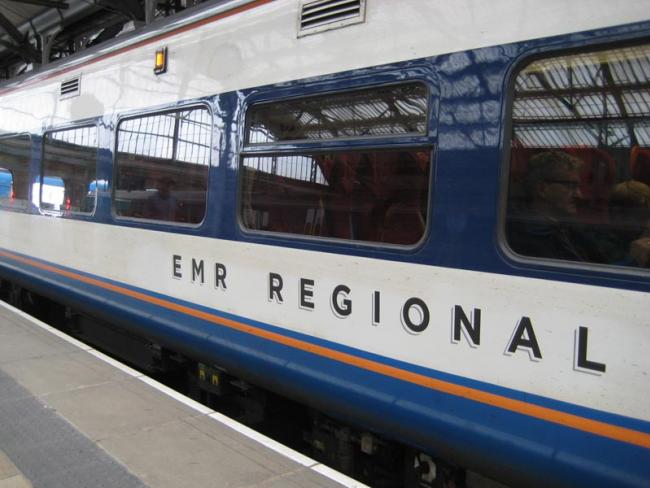21 May 2021

Dutch national rail subsidiary Abellio took over the East Midlands franchise in 2019. Foreign state ownership of Britain’s rail services is set to continue after the Williams–Shapps report. Photo Workers.
The Williams–Shapps Plan for Rail – a government White Paper – has finally been published. And like too many of Britain’s trains, it arrived very late and was truly underwhelming.
The report carried with it a whiff of past times – Network Rail will be transformed (back?) into something called Great British Railways (GBR) which will remain in the public sector, using British Rail’s famous double arrow symbol in its branding. Rail and wheel will be re-united under GBR as one controlling organisation – now that the dead hand of EU law cannot prevent it.
But nothing fundamental will change. This was underlined within hours of the White Paper being published when First Group announced that it has already secured new rail contracts to run services that look almost identical to the South Western and Transpennine franchises that First Group has been running. These are services which effectively went bust when Covid-19 arrived, and which the government has been propping up with taxpayers’ money ever since. Going forward, First Group will not have to bear any financial risk – that will be borne by us, the taxpayers.
Private sector
The message is clear: the government has no intention of reducing the involvement of the private sector in running Britain’s train services. Indeed, it has no intention of even reviewing the way in which the new concession contracts will be structured.
And if your local train service is run by one of the many foreign state-owned rail corporations that operate in Britain, it seems certain that they will be given the concession to carry on running that service, and will continue to be free to make profits and use them to invest in the railways of Berlin, Bordeaux and Barcelona. No wonder that German firm Arriva (the British arm of Deutsche Bahn) immediately welcomed the changes proposed. With no financial risks, why wouldn’t it?
Improvements
True, there are some things that may improve the industry. GBR will be awarding the new contracts instead of the Department for Transport, which does at least mean that decisions will be made by railway people and not by clueless civil servants. And the state-owned GBR will own the infrastructure, receive the fare revenue, run and plan the network, and set most fares and timetables.
Commenting on the change, Prime Minister Johnson finally admitted that the era of fragmentation, confusion and over-complication wrought on the railways after it was privatised by the Conservative government in the 1990s has been a massive failure, and has cost the taxpayer much more than it should or need have done.
The railway industry today is based upon a maze of agreements between hundreds of different parties, drawn up and policed by battalions of lawyers and consultants, including an entire staff dedicated to arguing about who is at fault for each delayed train. Change is slow and comes by painstaking negotiation.
The government promises a railway that will be more agile: able to react more quickly, spot opportunities, make common-sense choices, and use the kind of operational flexibilities normal in most organisations but difficult or impossible in the current contractual spider’s web.
Failure
The government expects the changes to save £1.5 billion a year. In admitting the failure of the current industry structure, the government is conceding that maybe British Rail wasn’t the “deeply inefficient” organisation that apologists for privatisation have often made it out to be.
The report hints darkly at changing the way stations are to be managed, and promised an end to queuing for paper tickets. Both of these spell job losses. With rumours of 9,000 jobs going in Network Rail, it is no wonder that the rail unions have been scathing about the proposals.
“This is a missed opportunity by the Government to make a clean break from the failures of the past'”
Reflecting the concerns of many rail staff, RMT General Secretary Mick Lynch said: “This is a missed opportunity by the Government to make a clean break from the failures of the past that have left Britain's railways in the slow lane.
“The Government talk about ending a generation of fragmentation but then leave the same private companies in place under this arrangement to extract management fees that could be invested in to building a truly integrated national rail network. The taxpayer carries all the risk while the train companies carry out bags of cash.
“If the Government were serious about recognising the impact of failed rail policy down nearly three decades they would cut out the middleman, strip away the dead weight of the private companies and work with their staff on building a transport system fit for the future where investment in the workforce and infrastructure comes first.
“It’s important ministers and members of this new Great British Railways’ board understand that you don't build for a bright future by threatening staff with job cuts and attacks on pay and pensions.”
